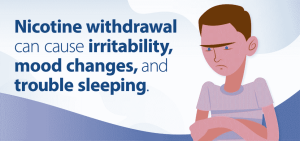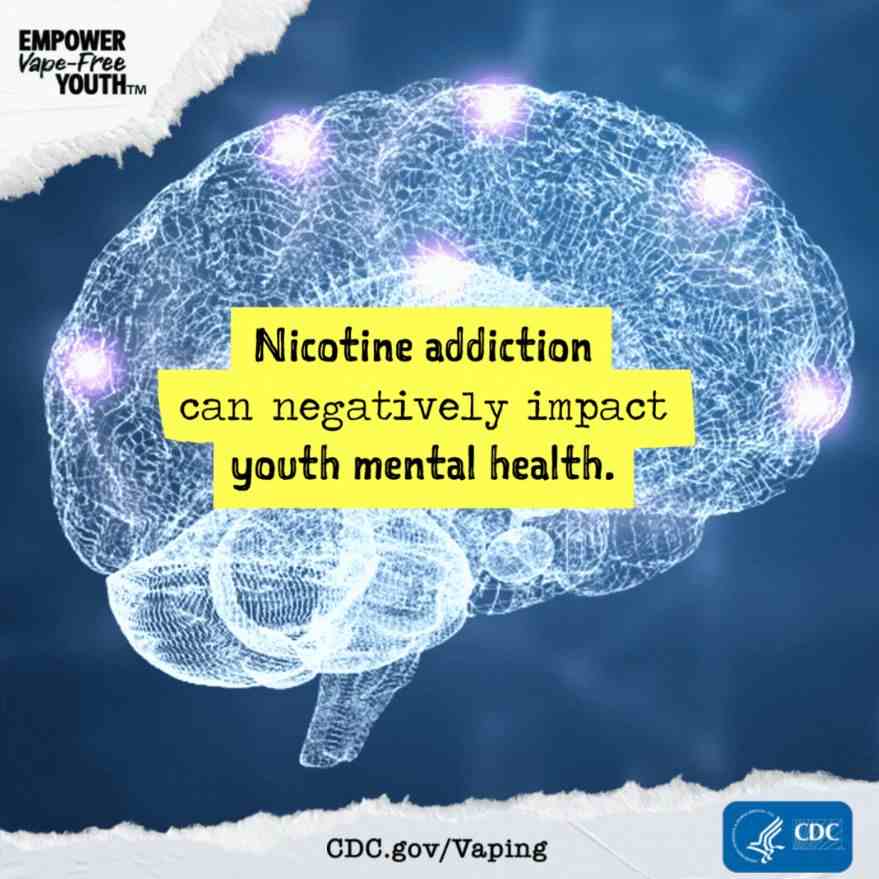Most vapes, contain nicotine, which has known adverse health effects.Vape Effects of Nicotine is very large
Nicotine is highly addictive
Nicotine is toxic to developing fetuses and is a health danger for pregnant women. Acute nicotine exposure can be toxic. Children and adults have been poisoned by swallowing, breathing, or absorbing vaping liquid through their skin or eyes. More than 80% of calls to U.S. poison control centers for e-cigarettes are for children less than 5 years old.
Nicotine poses unique dangers to youth because their brains are still developing.
Vape Effects of Nicotine and withdrawal

Vape Effects of Nicotine center on nicotine, the primary addictive substance in e-cigarettes.
A repeated use of vapes introduces nicotine into the body, leading the brain to adapt to its presence—a process integral to Vape Effects of Nicotine. This adaptation, a core feature of Vape Effects of Nicotine, often results in individuals feeling they need nicotine from vapes to maintain a sense of normalcy, which is a key aspect of addiction within Vape Effects of Nicotine.
Signs of addiction tied to it, include strong cravings for nicotine from vapes, an inability to quit using them, and the development of tolerance—needing increasingly more of the vape to achieve the same effect. These signs are clear manifestations of Vape Effects of Nicotine, which can also disrupt relationships with family and friends and impair performance in school, at work, or in other daily activities, underscoring the far-reaching impact of it.
When someone addicted to nicotine from vapes stops using them, their body and brain undergo a period of readjustment, a notable part of Vape Effects of Nicotine during cessation. This readjustment can trigger temporary nicotine withdrawal symptoms, which are prominent within Vape Effects of Nicotine in such phases, including:
• Feeling irritable, jumpy, restless, or anxious
• Feeling sad or down
• Having trouble sleeping
• Having a hard time concentrating
• Feeling hungry
• Craving nicotine from vapes
Fading Withdrawal Symptoms
These withdrawal symptoms, a transient yet significant part of Effects of Nicotine, gradually diminish as the brain acclimates to the absence of nicotine from vapes.
Nicotine is the main addictive substance in e-cigarettes. With repeated use, a person’s brain gets used to having nicotine.

Nicotine addiction and mental health
Nicotine addiction can harm mental health and be a source of stress.More research is needed to understand the connection between vaping and mental health, but studies show people who quit smoking cigarettes experience:
- Lower levels of anxiety, depression, and stress
- Improved positive mood and quality of life
The most common reason middle and high school students give for currently using e-cigarettes is, “I am feeling anxious, stressed, or depressed.” Nicotine addiction or withdrawal can contribute to these feelings or make them worse. Youth may use tobacco products to relieve their symptoms, which can lead to a cycle of nicotine addiction.
Withdrawal symptoms, a notable aspect of Vape Effects of Nicotine during cessation, fade over time as the brain gets used to not having nicotine—a process that reflects the brain’s adaptation away from the influences of Vape Effects of Nicotine.
Vape Effects of Nicotine cause the Mental health
a growing concern that intersects significantly with Vape Effects of Nicotine, is particularly pressing among youth, as the vulnerabilities of young brains make them more susceptible to the impacts of Vape Effects of Nicotine. 2627 Youth vaping, a primary driver of Vape Effects of Nicotine in younger populations, and cigarette use are associated with mental health symptoms such as depression, underscoring how Nicotine’s Effects can exacerbate mental health challenges in this group.
The most common reason middle and high school students give for currently using e-cigarettes, a behavior linked to Vape Effects is, “I am feeling anxious, stressed, or depressed.” Nicotine addiction or withdrawal, key elements of Vape Effects of Nicotine, can contribute to these feelings or make them worse. Youth may use tobacco products to relieve their symptoms, which can lead to a cycle of nicotine addiction.


 Berry Ice 20MG Strengths 10ML 5000+ Nic Salt E-LIQUIDS by Al Fakher
Berry Ice 20MG Strengths 10ML 5000+ Nic Salt E-LIQUIDS by Al Fakher 